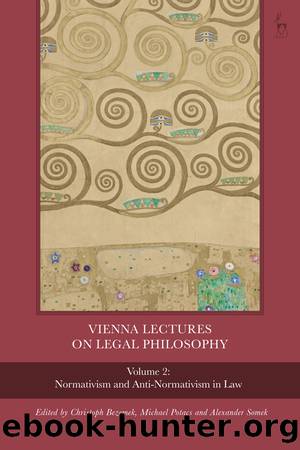Vienna Lectures on Legal Philosophy, Volume 2 by Christoph Bezemek;Michael Potacs;Alexander Somek;

Author:Christoph Bezemek;Michael Potacs;Alexander Somek;
Language: eng
Format: epub
Publisher: Bloomsbury UK
Published: 2020-06-15T00:00:00+00:00
XIV.AMBITIOUS QR: DOOMED IF YOU DO AND DOOMED IF YOU DONâT?
Crispin Wright objects to Blackburnâs quasi-realist programme, that it confronts a serious dilemma: either it fails, which means that Blackburnâs projectivism is not able to account for our linguistic practices, or it succeeds, which means that Blackburn has managed to explain that our linguistic practices are assertoric and truth-apt, which is what he began by denying. So if Wright is right, the quasi-realist is doomed if he succeeds (pââ¥) and doomed if he doesnât succeed (âp ââ¥). Here is Wright:
The goal of the quasi-realist is to explain how all the features of some problematic region of discourse that might inspire a realist construal of it can be harmonized with objectivism. But if this program succeeds, and provides inter alia â as Blackburn himself anticipates â an account of what appears to be ascription of truth and falsity to statements in the region, then we shall wind up â running the connection between truth and assertion in the other direction â with a rehabilitation of the notion that such statements rank as assertions, with truth-conditions, after all. Blackburnâs quasi-realist thus confronts a rather obvious dilemma. Either his program fails â in which case he does not, after all, explain how the projectivism that inspires it can satisfactorily account for the linguistic practices in question â or it succeeds, in which case it makes good all the things the projectivist started out wanting to deny: that the discourse in question is genuinely assertoric, aimed at truth, and so on.83
Wright notes that Blackburn might want to object to the proposed dilemma, that his (Blackburnâs) idea is precisely that it is only the quasi-realist account, of, say, moral reasoning and moral statements that gives us the right to speak of moral matters in an objectivist way. Wright objects, however, that if this is so, the quasi-realist program is actually a detour on the way to what counts, namely, the notion of truth:
Working with that idea, and pursuit of the quasi-realist program on its basis, may help us to focus on the notion of truth that is appropriate to the statements in question. But once that focus is achieved, we have to drop the idea â and it hardly seems credible that only by this somewhat circuitous route can the requisite focus be gained.84
I find Wrightâs objection well worth thinking about, though I also find the proposed alternative, that the notion of truth is not uniform across all regions of assertoric discourse, somewhat difficult to understand.85 I shall not, however, pursue the very difficult subject matter of truth here.
Download
This site does not store any files on its server. We only index and link to content provided by other sites. Please contact the content providers to delete copyright contents if any and email us, we'll remove relevant links or contents immediately.
Future Crimes by Marc Goodman(2998)
American Kingpin by Nick Bilton(2966)
The Meaning of the Library by unknow(2064)
Inside the Middle East by Avi Melamed(1937)
On Tyranny by Timothy Snyder(1857)
Why Nations Fail: The Origins of Power, Prosperity, and Poverty by Daron Acemoglu & James Robinson(1784)
Living Silence in Burma by Christina Fink(1726)
Putin's Labyrinth(1655)
The Mastermind by Evan Ratliff(1589)
Think Like a Rocket Scientist by Ozan Varol(1393)
Law: A Very Short Introduction by Raymond Wacks(1380)
The Smartest Kids in the World by Amanda Ripley(1365)
Leadership by Doris Kearns Goodwin(1348)
The Rule of Law by Bingham Tom(1316)
A Dirty War by Anna Politkovskaya(1311)
It's Our Turn to Eat by Michela Wrong(1299)
Philosophy of law a very short introduction by Raymond Wacks(1296)
Social Media Law in a Nutshell by Ryan Garcia & Thaddeus A Hoffmeister(1248)
Civil Procedure (Aspen Casebooks) by Stephen C. Yeazell(1171)
